| Book | Review | Permalink of the review | |
|---|---|---|---|

|
Winning by Jack Welch, Suzy Welch | Undoubtedly, one of the truly inspiring books I've read since I entered the corporate world. Had heard a lot about the legends of Jack Welch in relation to propelling GE to its glory with a 400% increase in valuation, to being ruthless about channelizing the businesses, to him widely considered as a management guru, and I must say reading about it in his own words just reaffirmed all of it.
The book is a classic "Theory-Example" book and most examples given to supplement the stated theory are from GE and the author's very own experience. And its supremely inspiring theories about 10-70-20 rule, concept of only-first-or-second businesses stay, importance of culture and its realization with Kidder Peabody acquisition etc are classic. While a lot of chapters talk about Jack's tenure at GE from being a chemical engineer to its most well-known CEO, it seldom comes across as an autobiography. Mostly because, the events of his life at GE have a story to tell. The book also highlights stories of a lot of his peers, subordinates, and colleagues at GE who did exceptional work but never were under the limelight. I'd say this book is more of a reference book for managers and in general, to people who aim to conquer the world. |
Library Goodreads |
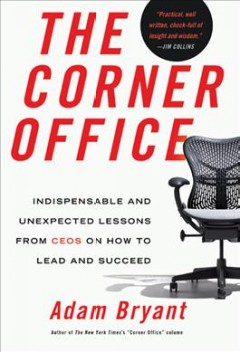
|
The Corner Office, by Adam Bryant |
Corner Office is one of those "Theory-Example" books that is not obfuscated and well streamlined to give the reader a straightforward idea and an example to support it. The examples taken to backup an idea are from acclaimed CEOs from a variety of industries - technology, hospitality, and even non-profits.
Tachi Yamada of Bill and Melinda Gates Foundation, Ursula Burns of Xerox, and Mark Pincus are probably the most highlighted ones. Ursula Burns makes her appearance in almost all chapters, in a good way, because her ideas are in fact worth adopting, and she does have a spectacular track-record at the C-level. Obviously, the book and its ideas and illustrations are catered towards C-Level leadership, and is a must-read for anyone that is focusing on the top job at the C level. As evidenced by so many CEOs, the job of a CEO has no rule book and no formula, and that is is best showcased by many chapters in this book. Because this book is based on the author Adam Bryant's NYTimes Corner Office column which is dedicated to CEO interviews, there weren't many examples from the lives and careers of American legendary CEOs of the past like Ford, Disney, Carnegie etc, but the book still does a great job of quoting examples from some of the highly successful CEOs of the current era.Some ideas highlighted in the book are very unique and novel - like Mark Pincus's "I'm CEO" campaign where he makes every one of Zynga's employees a CEO and his concept of OKRs, Zappos CEO's extreme focus on customers and his chaotic LinkExchange growth, stand out. Overall, the book is inspiring and offers innovative guidelines for leaders and leaders-to-be, and I found it a pleasant and uncomplicated read. |
Library Goodreads |
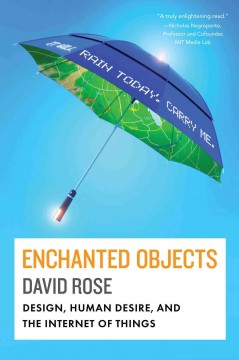
|
Enchanted Objects, by David Rose | If you're even remotely a fan or admirer of Internet of Things, this book is a must-read. While I do have some reservations on making regular objects "enchanted" individually (and not use a connected network, or use a smartphone for the same), the concept and ideas presented are still very captivating.
I personally believe that while some enchanted objects mentioned in the book like the enchanted umbrella, or the notifying pill-bottle are sensical, a few, like the color-changing orb could have just been a smartphone screen (say an app) just from the cost perspective. The definition of "enchanted" object is well presented, although many would just mistake it for a "smart-object (like a smart-umbrella, which could be nothing more than an umbrella connected to the internet). It's clear that a lot of effort has went in in clearly categorizing the "Abilities" of an enchanted object - like Glanceability, Gesturability etc (not to mention Loveability, the core of all hit products). While I'm unsure if the enchanted objects make a lot of sense economically, particularly for non-mass scale production, they definitely make the things around us much more useful in ways we haven't even thought of. Overall, a great read for anyone who wants to take a pleasant ride in the narrow street between imagination and practicality. |
Library Goodreads |
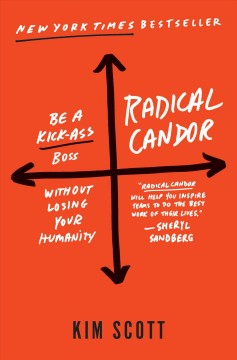
|
Radical Candor, by Kim Scott |
I read this upon the recommendation of my seasoned Engineering Manager. And it didn't disappoint. Kim Scott comes with an extensive experience from many Silicon Valley biggies, so her insights and guidance are worth a shot. That said, even though the book is organized well, it just seems a lot more pedantic than most "guide" styled books. I believe more real life stories and examples would have added much more color and credibility to the topics that are discussed in the book.
While the concept of "Radical Candor" itself is innovative and appealing, and while the graph that divides things on "Challenge Directly" and "Care Personally" quadrants is very sensical and novel way of looking at managing people and team, the explanation of those looks very verbose at times. I guess it mattered that I read this right after Jack Welch's Winning and Adam Bryant's The Corner Office, both of which were very real-life-example heavy, that in turn made the theory the authors were trying to convene both convincing and inspiring. Some of the unique things like allocating "Think Time" (which I'm totally going to try), "Walking Time" etc are very cool and adoptable, others like Kanban boards already seem old and outdated. The classification of top performers into SuperStars and RockStars made sense too. I also saw an overwhelming bias (for good, to be fair) towards policies at Google (right from the very beginning of the book where the author writes of her interaction with Larry Page while he was in a meeting with someone else). I particularly liked the story about AdSense cold-calling big firms all the while getting huge number of calls from small-firms. Overall, I feel this is a one time read, as opposed to be treated as sort of a Reference Guide for first time managers. I think books like this that fall into the "Theory-Example" category needs a lot more examples that there are in this book. |
Library Goodreads |
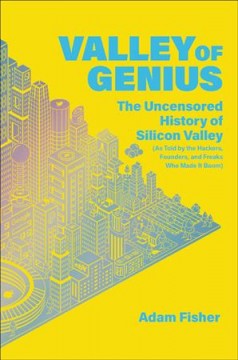
|
Valley of Genius, by Adam Fisher |
This is a book written in a very unusual yet captivating format. The book is written in the form of a chronologically ordered series of first-person accounts of the evolution of Silicon valley! The format itself is so innovative, and that made sense given the topic is about the 'Valley of Genius'.
The unfortunate thing is that the book starts from the times of Atari. There has been no mentioning about the pioneers of "Silicon Valley" like William Shockley, his Shockley semiconductors, Fairchild, the Traitorous Eight etc. I believe the valley of genius originated there. Nevertheless, the stories starting with Nolan Bushnell and gradually moving towards Apple is nothing short of riveting. There are countless stuff in the book that could easily make it to quiz shows and trivia nights. There are stories in the book about how engineers built all the things that we take today for granted, and they're spellbinding. I was particularly caught rereading a paragraph about how they built the Finder on Mac - " Bruce Horn: Steve Capps and I were working on the Finder. We worked all the time. I was twenty-three, I'd have my headgear on at night, and Capps and I worked all night. We had tee-shirts that said 'Ninety Hours a Week and Loving It'. " And that was just the beginning. Overall, this book is a masterpiece, and I could visualize the book as a two-hour long interview with people just appearing on screen and delivering their lines. I would love to imagine other books written in this format - like books on World War 2, for example. |
Library Goodreads |
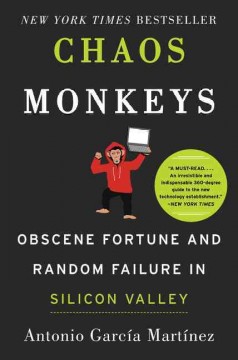
|
Chaos Monkeys, by Antonia Garcia Martinez |
I think the book is a decent read, if not highly captivating or motivating. I picked up the book thinking it was a general take and stories on happenings in Silicon Valley start-ups, but it turns out to be a sort of career-autobiography of the author Antonio Martinez. That made the story a little limited in its scope.
The parts where the author explains his time at Goldman Sachs are really interesting. The betting games on the trading floor of Goldman, anecdotes like "This is War room, no fighting" and "No betting on Goldman floors" were amusing. The life of the author at Adchemy is more akin to any engineer's life at any start-up in Silicon Valley - always looking for clients, promising first and then pursuing, tussle with the management, you see the usual suspects. I literally Googled the CEO of Adchemy Murthy Nukula to see if he really had the terrible reputation mentioned in the book, in public life. Some stories on Facebook's early take on ads, not taking ads team seriously etc are interesting to read through, along with the details of how meetings happened at Facebook in its earlier days, with Mark and Sheryl. The YCombinator section was engaging as well (also learned about the Y combinator being a function that returns a fixed point of another function, referring to YCombinator being a company that runs other companies). Overall, the book is enjoyable, and gives us insights about some of the Silicon Valley companies. |
Library Goodreads |
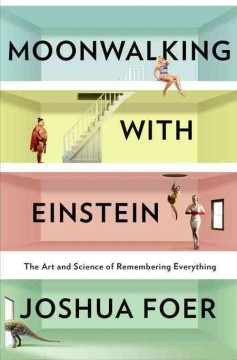
|
Moonwalking with Einstein, by Joshua Foer |
While the book has nothing much to do with either Moonwalking or Einstein (which is why the sub-title - 'The Art and Science of Remembering Everything' is so important), it gets clear in the first few chapters themselves why the author chose the name. Trust me, the name IS relevant.
For a long time, I have resisted on improving my "memory power" as I constantly felt that human brain should be used less to "store information" and much much much more for "thinking" and "innovating". My reasoning was simple: in the age of computers, information is no more a big deal. Just Wikipedia has all the general info we need! But coming to thinking? We are still far-away from complete AI (I don't know what's next when we have AI building AIs, that's just a scary thought for now). So, I'd rather spend my neurons thinking about and innovating on something that computers can't yet do. All that said, this book was still so captivating, and made me realize how much I actually needed my "cache" memory in regular day to day life. The chapters of the book where it talks about the habits of memory savants and World Memory Champions is nothing short of gripping. But the thing that had me was the fact that we can't store more than 7 things at a time in our brain! This seemed unbelievable at first, so I did some experiments. I play this game called QuizGeek where it asks ten questions one after the other, with a timer. After every game, I tried to recall all the ten questions. I was awestruck that in close to than 97% of those games I played, I could literally only recall 7 questions even when I tried so desperately hard (I still have the results from those experiments in my app for reference). And then I started using the technique of "Memory Palace" explained in this book (which turns out to be a pretty famous technique). Within couple of days, I ACTUALLY could recall more than 7 questions and answers, sometimes all ten of them! I use that technique now for things in my to-do list, ideas-list, grocer-list etc, and while it does look stupid, the technique sure has a tendency to make you more imaginative at the least. Overall, I think the book is a great read for anyone interested in how our memory works, from a non-technical perspective. |
Library Goodreads |
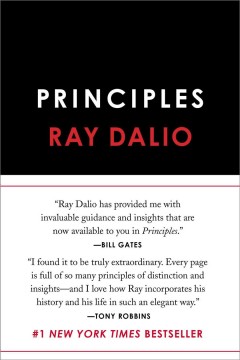
|
Principles, by Ray Dalio |
Needless to say, one of the finest books I've read on business that was also equally inspiring. This book by Bridgewater Associates's founder and CEO Ray Dalio was on my to-read list for a long time.
The book is divided into many sections, some related to his career and life in general, and others related to his principles. Unfortunately, since I'm not a fan of pedantic teaching, I only hovered upon the sections that spoke about principles strictly, thereby not doing justice to the name of the book itself. However, the part that fascinated me the most, and which I reread more than once, was the first section of the book where the author describes his ascent to the top of the world, starting from scratch. His stories about making business mistakes of all kinds, losing money, being reduced to just two people at Bridgewater (him and Coleman), borrowing money from his dad - in author's own words, these experiences were like a series of blows to the head with a baseball bat. Despite all that, persistence is finally what took Bridgewater to where it is now. That, teaches a lot more than theoretical principles. Many of the factual incidents about silver speculation, stories about his oil friends, his All Weather fund etc are extraordinarily mesmerizing. Accounts of his personal life, with four sons, amidst of all the Bridgewater chaos are truly inspiring as well. Overall, this high expectation book didn't fail to entertain, and I wouldn't mind keeping the book as a reference. |
Library Goodreads |
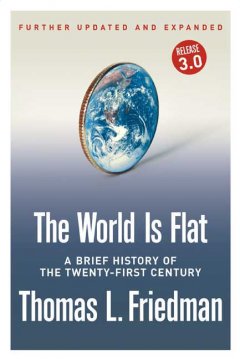
|
The World is Flat, by Thomas Friedman |
I have been a fan of Thomas Friedman because of his generally optimistic-capitalistic views (and also things like his support for Aadhar, his rare praise for the Chinese one-party autocracy etc) and this book - The World is Flat simply seemed to be an obvious extension of that theme. The book was brimming with capitalistic thoughts and ideas, and it appealed to my inner self.
The first half of the book was even more relatable because it was all about outsourcing and offshoring, not just in software but also other areas like accounting, manufacturing etc, something I've seen happening in my close circles. As I was doing a small project for Intuit at the time (part of their interview process), the accounting outsourcing really piqued my curiosity. Loved the case-study of UPS as an example of insourcing - employees doing everything needed beyond just shipping. The book, unsurprisingly, is teeming with historical trivia of all sorts. From Wikipedia's origins as Bomis.com's baby Nupedia which was eventually outgrown by Wikipedia (it's surprising how Nupedia was a wiki written by pros and experts, and then Wikipedia opened it up for everyone, and then Google did a Know which was Wikipedia written by pros and experts :)) to tit-bits about Walmart's innovative use of technology in handling supply chain, the book never ceases to amaze with its trifles. Like the Golden Arches Theory in his previous book The Lexus and the Olive Tree, this book has a rather upgraded version of that theory called Dell's Theory of Conflict Prevention. While I'm not sure who valid it is with the ongoing Trade War between the US and China, it has fared well in almost all the examples given in the book, at least with Dell. Finally, would like to say that this book is a great read if you fiercely love or ardently hate capitalism. |
Library Goodreads |
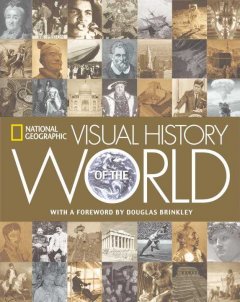
|
National Geographic Visual History of the World, by Nat Geo Society |
This is a reference book from all angles, but I made the mistake of actually reading it, as I submitted to the quizzer inside me, and couldn't put the book down. It took almost two months to just glance over every page and read the interesting portions that appealed to me (which was almost every page).
Needless to say, Nat Geo's commitment for clarity and organization of this book is commendable. The story is laid out in chronological order as one would expect, but also spans breadthwise on most occasions, touching boundaries that most History books would generally ignore. The illustrations were exemplary, all the way from the very beginning of civilization at one end to Space Age at the other. This is the book equivalent of a space-time graph of human civilization. I liked the way the editors kept this book limited to facts, without leaving any room for any biased opinion. While this book is a sheer treat for the fans of history, geography, evolution of ideas, and quizzers in general, it can seem very lengthy and tedious if you're not any of them. |
Library Goodreads |
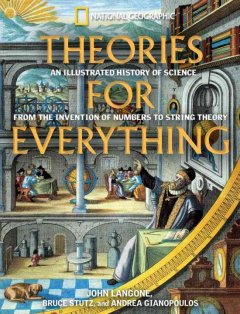
|
Theories for Everything, by John Langone |
Theories for Everything is a book you must read if you like History and Science. The book was all about the History of Science, decorously compartmentalized into various sections like The Heavens (Astronomy), Life Itself (Biology), Mind and Behavior (Neurology) etc. Every section is loaded with indigestible amount of ultra-interesting information about the origin and evolution of scientific ideas.
The trivia on the side of the pages were delightful to read. From stuff about Paul Rubens stuffing hundreds of Greek philosophers in his School of Athens to Tycho Brahe's temperament that cost him his nose, the book's gamut of knowledge is widespread. I learnt more about the rationale for finding vaccinations, their early trials, and eventual success from this book than from all the biology classed I'd attended. Every section is intellectually stimulating, so it's hard to skip any page, making this book very time-consuming to finish. And when I did finish, I wanted to reread it, and keep the book as a reference book with myself, even thought I had to return it to the library! (I returned). |
Library Goodreads |
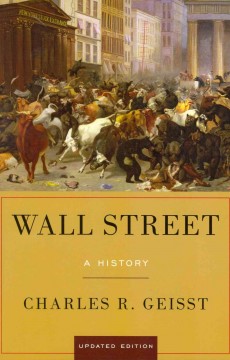
|
Wall Street, A History, by Charles R. Geisst |
This was my first book on Wall Street and boy did I pick a very comprehensive one. The author's views on the history of securities in the US and Wall Street are interesting given he's a finance professor. I found it surprising how most of the Wall Street disasters have been directly attributed to ill regulations, and not directly to policy itself.
The book is rather lengthy and verbose, but the enthralling stories it tell of early Wall Street biggies make it worth a read.
The book touches upon almost all big events of the American history itself as most of those are directly or indirectly linked to the Wall Street. From the very beginning of Wall Street when Peter Stuyvesant built a barricade to the rise of Robber Barons, to the great financing trends of the railroad industry, to innovations of Bell and Edison, everything is tied to Wall Street. And the book has successfully captured it. The book occasionally becomes very technical and almost resembles a text book, and in the right spirit. Some materials have to be studied with a rigorous, academic devotion. Overall, this book is a must read for anyone interested in US history, economics and policies of Wall Street, and the evolution of regulations in securities. |
Library Goodreads |
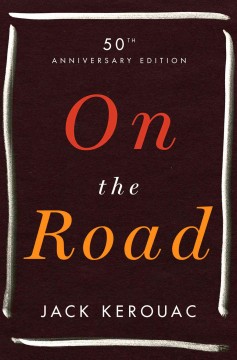
|
On the Road, by John Kerouac |
Obviously, we all know this book is a classic. Reading this was pure bliss! Reading this was meditating via reading. Reading this was a bibliophile orgasming. This is also the first book that I've read this year that I'm going with a five star rating.
The way Jack Kerouac put the Beat generation using his run-on sentences and easy-flowing paragraphs that famously came out of a type-written scroll is legendary. I haven't read a book in a long time that made me stay up an entire night just to continue reading. The story, essentially a semi-autobiographical travelogue, in this book is simple, yet terrifically profound. While it's hard to explain the plot, It's about Sal Parasise's travel from New York to Denver, to Chicago, to San Francisco and to Mexico. And his interactions with his friends, most notably Dean Moriarty. There are innumerable other strangers who pop-in and pop-out of the story in almost all chapters. I want to now review this book from a road-tripping fan's perspective. If you're a long distance road tripping fan, this book is the closest thing to actually road-tripping. Reading this book makes you wanna go on a road-trip, meet new people, get fresh air, speak in funny accents, drink new beer, eat different food (and Apple Pie, the food eaten this book most often e), laugh, cry, look at the unending sky, fly off the wild blue yonder. The book made me go on two long road-trips, and also visit the Loneliest Road in the US - US 50 in Nevada. It also made me wonder about the times before the Interstate Highway System when the hippie road-tripper's primary way of traveling was in fact hitchhiking! How fun. I wanna read this book again, and go road tripping again. The book is so good there's no way a movie based on this could justify the experience. The only thing that could add to and match the beauty of this book is the reader's own imagination. |
Library Goodreads |
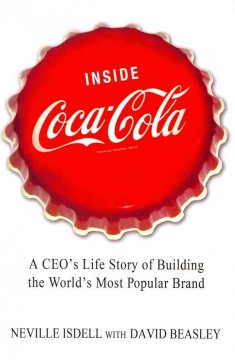
|
Inside Coca-Cola, by Neville Isdell |
This story of Neville Isdell, the author of this book and the former CEO of The Coca Cola Company, can easily be directed into a high-octane travel movie - enthralling in the first half, gets too monotonous in the second. The book is about the author's journey from joining a bottling partner of Coca Cola in Zambia to becoming its CEO - undoubtedly one of the truly inspiring corporate growth stories.
The story is set in Ireland, in Zambia, in the Philippines, in India, in the US amongst others. And every geography has its share of amazing stories and interesting plots. Particularly, the borderline shady things explained while Isdell was in Congo and South Africa is nothing less than the plot of a Martin Scorsese movie. These sections also give the reader an insight of the global history of Coca Cola, like they leaving South Africa over Apartheid, like Indian government asking Coca Cola in 1977 to team up with a local partner and disclosing their secret formula etc. The story about India is specifically interesting for me as it includes some of the really cool stories of how Coca Cola rejected the then young athlete named Sachin Tendulakar thinking it was a waste of money, and hence lost to Pepsi forever, of how IBM too pulled out of India as they were asked to reveal their source code like how Coca Cola was asked to reveal their secret formula, of deal signing based on astrologer set date etc. If there's one thing I'd take away from this book, it's the fact that one would have traveled through an exceptionally arduous path to get to the top, the one that would require substantial time and emotional investment, lot of bravery, unyielding persistence, and most important of all, the vision. If you're looking for a "On the Road" kind of real story with a pinch of the history and inner workings of one of the world's most popular brands, this book is for you. |
Library Goodreads |
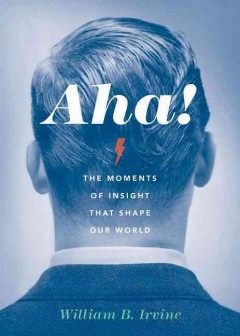
|
Aha! The Moments of Insight That Shape Our World, by William Braxton Irvine |
"Aha! The Moments of Insight That Shape Our World" is a great blend of tales of eccentric and uber-interesting real life events, and the author's hypothesis about the origin, evolution, and appearance of Aha moments! I was initially skeptical about the author's decision to categorize Aha moments into their prevalence in five fields - religion, morality, Science, Mathematics, and art, but after reading the individual sub-sections, I was completely in unison about the same! It just made total sense to split the Aha moments that way, and then analyze them separately, for they have many threads in common.
Author has done a lot of research and put ample effort in collecting various interesting stories, from art to Mathematics to morality. Except for the story of Andrew Wiles' quest about proving Fermat's Last Theorem,pretty much all others were new to me! The stories of struggle of Lynn Margul, Kerouac's tryst with benzedrine while writing On the Road, Stan Ulam's spirals, Rota's unique bibliography that included people who were never part of the book, the duel of Math prodigy Evarista Galois, Gerald Guralnik's unpublished version of Higgs-Boson, Penzias and Wilson's success in supporting the CMB claims, etc were all jus fascinating to read. Although the author does not conclusively offer any proof or argument to support his hypotheses from a neurological basis, the hypotheses themselves are very intriguing and worth pondering over. Overall, this was an intellectually stimulating read that was also teeming with trivia. |
Library Goodreads |
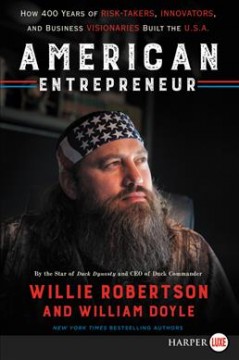
|
American Entrepreneur, by Willie Robertson |
American Entrepreneur is one of the very inspiring books I read in a long time. Loved the way the author portrays the Founding Fathers as entrepreneurs who built unparalleled empires! I had never looked at Pilgrims, George Washington, Hamilton, and other early American pioneers as entrepreneurs. But now I see them as that, it's hard to think of them as anything but that - mega-entrepreneurs who started a start-up and made it an empire from sheer hard-work and dedication!
The way the author unearths entrepreneurship skills ingrained in Native Indians is particularly interesting, and unique. Their trade network, trade fair, interaction with Europeans from businessmen's perspective were unfurled remarkably well.
Also got to learn more about people and events I had not really given so much thought - like Robert Morris and him financing Washington; a wide array of Washington's businesses including fishery, Whiskey distillery, real-estate; Stephen Girard's work during Yellow Fever outbreak; Tudor's absurd and unique ice shipping industry; Vanderbilt's accidents, etc.
Learnt a few interesting things as well about JP's nose (: \)); Morris Notes, Sewing-machine Singer's extra-marital affairs, the link between Edison and Ford (Edison provided Ford with the place to build this machines in the early days); John Merrick's barbershop empire; Madam CJ Walker and her black entrepreneurship, etc.
Was delighted to see a mentioning of Daymond John's FuBu empire in the book!
It was a tad bit annoying to read the author bring up his own family and wife so many times in various occasions, but that could be easily discounted for, for the great amount of inspiration the book offers. |
Library Goodreads |
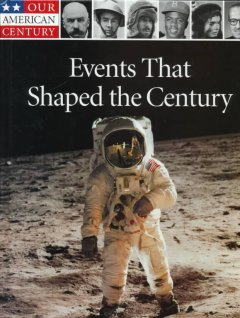
|
Events That Shaped the Century, by Baker and Taylor | Loved the structure and information content of this book. I couldn't think of a single landmark political event of the century that's not covered in this book. Need one like this for tech advancements after the evolution of the internet. Also, need a website that lays out things exactly in the "book format". 125 events that have transformed and shaped America since 1900. What unfolds is not only a timeline, but also a story of how these moments have effected all aspects of American life, from our government and our role in the world to technology, science, music, art, women's and civil rights, and even our perception of what it means to be an American. Interspersed among the articles are shaded sidebars that discuss the important events that were happening around the world at that time. The layout of text and pictures is colorful, easy on the eyes, and interesting. The text is lively, succinct, and immensely informative. The book will serve both the recreational and assignment needs of students, and may very well spark an interest in further research. |
Library Goodreads |

|
Tim Gunn's Fashion Bible, by Tim Gunn |
For the most of my adult life, I had zero knowledge about fashion, let alone any fashion sense. I wore clothes that were probably out of style, color mismatched, and terribly missized. It made sense to my minimalist-clothing approach. But I decided to fix it a bit anyway and thus embarked on this book about Fashion by Tim Gunn, a fashion consultant. And it didn't disappoint.
I'm generally skeptical of books that exaggerate the validity and comprehensiveness of their content by using 'Bible' in their titles, but this book was pretty much an exception. I learned about a lot of different kind of clothing (not just the obvious ones, but also some inconspicuous ones like gloves, hats, even flip flops) their evolution, interesting trivia about them (like how Levi's introduced the concept of Casual Fridays in 1991 thereby propelling their denims even to workspaces), their types (Did you know just in shorts, there are 9 different styles - Hot Pants, Daisy Dukes, Short-Shorts, Regulars, Bermuda, Culottes, Gauchos, Pedal-pushers, and Capris?), and people behind them (both in terms of people who in some way contributed to their development and in terms of people who modeled, stood behind them and posed for an ad). But one of the cooler sections of each chapter was the one at the end where the author made the readers go through their wardrobe and list things in a table, and then decide what to keep and what not based on a set of criteria. I thought that was unique! Overall, this book brought in me an awareness about fashion trends all the while being very pleasant to read. |
Library Goodreads |
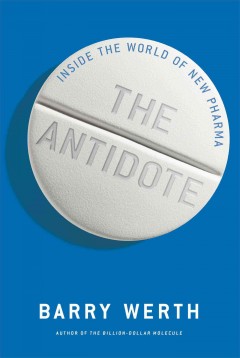
|
The Antidote, Inside the World of New Pharma, by Barry Werth |
I have always closely followed pharmaceutical and biopharma stocks, and fascinated by their extreme volatility (except for few very big ones like J&J), which was the result of a trial going wrong, or a failed drug test, an FDA approval of their drug etc. The Antidote book opened my eyes to why that was the case, and in a very thriller-novel like way.
The book is about Vertex Pharmaceuticals, its founding, losses, failures, and eventual success. Its founder Joshua Boger's undying persistence to make it big is a story as inspiring as any! He mentions his goal was to make Vertex a company with a billion dollar revenue and stand up against biggies like Merck, and it took him little over 22 years to accomplish the same. But the book is not just about successes. The book is about all the failures of Vertex prior to reaching great heights, failure in HIV related drugs, and their eventual fortune with Hepatitis C drug. The book also elaborately describes all the politics, bureaucracy, and non-technical struggle in getting a drug successfully into market. The book, though not very technical, also goes through the basics of enzymes and other biopharma related terms and processes wherever needed. This is my first book on the extremely operose and volatile business of biopharma and pharmaceuticals, and I thoroughly enjoyed the work. |
Library Goodreads |

|
History of Art for Young People, by HW Janson |
This was the perfect book for an introduction to the world of art. And by art, it's not just paintings, the book covers a wide breadth of most art forms including music, motion pictures, sculptures/architecture, and of course painting at the crux of it.
While I was aware of most classic and renaissance time paintings, my knowledge was largely fragmented. I loved Monet's Impression without even understanding its context and where is came from. I was fan of Rembrandt, but didn't really know where he or his works fitted in the bigger picture. So my knowledge needed a big orientation, and this book was the perfect magnetic field that oriented my iron-hard interest in art with right polarization. The book lives up to its name by promptly diving into art chronologically. By doing so, it gives the amateur reader of the arts a great context about the evolution of different art movements like Renaissance paintings, High Renaissance paintings, Mannerism, the highly ornate Baroque, Realism, Impressionism and Post Impressionism, Expressionism, and finally modern art movements like Cubism, Surrealism and Abstract Expressionism. The book doesn't go into technical details of art and art forms, neither does it delve too deep into lives of artists themselves, giving only essential information thereby keeping it simple and elegant. If you need an introduction to the artistic world, this book could a very good first read. |
Library Goodreads |

|
Hygge: How to Practice the Danish Art of Coziness, by Joanne Hillyer |
A short and sweet read - perfect for a Hygge-Sunday. The book lacked pictures though, which are typically core components of Hygge books.
Well categorized, the book talks a bit about the etymology of Hygge, its equivalents in Dutch, German etc, then dives a bit into its history which is more or less tied with the history of Denmark itself - more like the stuff you could find in Wikipedia.
Then the author tries to explain why Danes are the happiest people in the world, and the usual suspects are highlighted - family, concept of coziness etc. In this well articulated section of the book, it would have been great if a comparison with Myanmar's National Happiness Index was included.
The part of the book that explains how to Hygge are typical of most Hygge books and well written. Elaborate but not boring, simple yet eyebrow-raising.
The glossary section where the author Joanne Hillyer lists like a hundred words related to Hygge is very interesting. I loved the word Hyggefacade - a facial expression used in social setting to pretend there's Hygge going on when there isn't really hyggelig. :)
Overall, this is a sweet and simple book that's a good Hygge-Sunday read. |
Goodreads |

|
Analytical Survey of Isavasyopanisad, by VV Mudholkar |
I'm not sure if I'm even qualified to review this outstanding book, which itself is an analytical review of yet another priceless, timeless philosophical and metaphysical piece.
Isa Upanishad is an incredibly revered work of ancient sages, which Mohandas Karamchand Gandhi thought so highly of it that he remarked, "If all the Upanishads and all the other scriptures happened all of a sudden to be reduced to ashes, and if only the first verse in the Ishopanishad were left in the memory of the Hindus, Hinduism would live for ever." And to do an analytical survey of such a profound work is no small task.
The very fact that as a mere mortal who could read and comprehend the Veerashaiva perspective of the Isha Upanishad as characterized by the author, the eminently qualified Dr.V.V.Mudholkar, makes me immensely happy. The book obviously explains the 18 verses of the original Upanishad with great detail, but the parts of the book that precedes that explanation, where it does an amazing job of elaborating on such complex topics such as Jiva's journey and Spiritual Diksha amongst others are truly unparalleled in their perfect blend of simplicity and profoundness. This is a book that takes a long time to read and understand, but also the one that makes the time spent on it absolutely worth it. |
I added this book to Goodreads as it was not listed on the website.
Goodreads |
